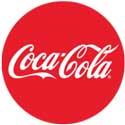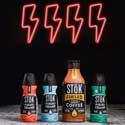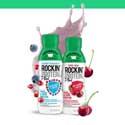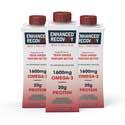Coca-Cola
Coca-Cola- New Zealand Plans To Significantly Cut Sugar Content By 2025
 Coca-Cola New Zealand has promised to cut sugar content across its beverages lineup by 20 percent within five years. The company’s long-term strategy is to reduce sugar in existing drinks, develop new no- and low-sugar options, provide smaller pack sizes, and dedicate significant marketing efforts to promote no- and low-sugar alternatives. The company said half of its growth has been in low- and no-sugar drinks in the past two years and is now selling more Coca-Cola drinks without sugar in supermarkets than Coca-Cola Classic. In addition, bottled water sales have increased nine percent and still water sales 13 percent in the past two years. In the past three eyars, the company has introduced several sugar-free and reduced sugar products, including Powerade Active Water, Coca-Cola No Sugar, Keri 50 percent Less Sugar Fruit Drink, limited-edition Coca-Cola Peach No Sugar, and Deep Spring Light.[Image Credit: © Coca-Cola Oceania Limited]
Coca-Cola New Zealand has promised to cut sugar content across its beverages lineup by 20 percent within five years. The company’s long-term strategy is to reduce sugar in existing drinks, develop new no- and low-sugar options, provide smaller pack sizes, and dedicate significant marketing efforts to promote no- and low-sugar alternatives. The company said half of its growth has been in low- and no-sugar drinks in the past two years and is now selling more Coca-Cola drinks without sugar in supermarkets than Coca-Cola Classic. In addition, bottled water sales have increased nine percent and still water sales 13 percent in the past two years. In the past three eyars, the company has introduced several sugar-free and reduced sugar products, including Powerade Active Water, Coca-Cola No Sugar, Keri 50 percent Less Sugar Fruit Drink, limited-edition Coca-Cola Peach No Sugar, and Deep Spring Light.[Image Credit: © Coca-Cola Oceania Limited]
Coca-Cola Japan Unable To Keep Up With Demand For Its New Alcoholic Beverage

Coca-Cola is taking advantage of the fact that flavored alcoholic beverages (FAB) such as chu-hi are hugely popular in Japan – in fact the only alcoholic beverage category that has experienced growth. The company’s chu-hi version, Lemon-Do, was launched nationally last October after a year-long, one-island pilot test, but was unable to keep up with demand. The company temporarily suspended shipping of Lemon-Do, but will resume shortly. The popularity of the drink, whose alcohol content ranges from three to nine percent, is likely to put competitive pressure on Japan’s other chu-hi makers.[Image Credit: © COCA-COLA BOTTLERS JAPAN INC. ]
Reporting Strong FY 2019 Revenue Growth, Coke CEO Says “The Right Strategies” Are In Place
 Coca-Cola’s organic revenue in fiscal 2019 grew six percent – two points ahead of the initial forecast and at the top end of the company’s long-term growth model. Revenue growth was three percent in North America, 13 percent in Latin America, and five percent in both Europe, Middle East and Africa (EMEA) and Asia. Net income attributable to shareowners of Coca-Cola was $8,920 million, or $2.09 a share, a 39 percent increase from $6,434 million, or $1.51 per share, in the previous year. “We see the right strategies taking hold,” CEO James Quincey said, “supported by the right partners, underpinned by a growing and vibrant industry, but we’re just getting started.” CFO John Murphy said the company expects to achieve results well within its long-term growth targets for revenue, profit, and earnings per share for 2020, despite a projected “mild currency headwind.” Investment bank Morgan Stanley said the company offers a “clearly superior” long-term growth outlook versus its consumer product goods peers. Quincey said it is too early to tell what the long-term impact of the coronavirus will be in China, but Coca-Cola has shut down some offices and factories and is supporting the Chinese government as it deals with the crisis.[Image Credit: © The Coca-Cola Company]
Coca-Cola’s organic revenue in fiscal 2019 grew six percent – two points ahead of the initial forecast and at the top end of the company’s long-term growth model. Revenue growth was three percent in North America, 13 percent in Latin America, and five percent in both Europe, Middle East and Africa (EMEA) and Asia. Net income attributable to shareowners of Coca-Cola was $8,920 million, or $2.09 a share, a 39 percent increase from $6,434 million, or $1.51 per share, in the previous year. “We see the right strategies taking hold,” CEO James Quincey said, “supported by the right partners, underpinned by a growing and vibrant industry, but we’re just getting started.” CFO John Murphy said the company expects to achieve results well within its long-term growth targets for revenue, profit, and earnings per share for 2020, despite a projected “mild currency headwind.” Investment bank Morgan Stanley said the company offers a “clearly superior” long-term growth outlook versus its consumer product goods peers. Quincey said it is too early to tell what the long-term impact of the coronavirus will be in China, but Coca-Cola has shut down some offices and factories and is supporting the Chinese government as it deals with the crisis.[Image Credit: © The Coca-Cola Company]
Coca-Cola Continues To Introduce Schweppes Novida In African Countries
 Coca-Cola plans to re-introduce Schweppes Novida Pineapple, a non-alcoholic malt beverage, in Ethiopia. The company acquired the production facilities after it bought the overseas rights to Swiss beverage brands such as Crush, Schweppes Pineapple, and others from Cadbury Schweppes 20 years ago. Coca Cola reportedly has been introducing Schweppes Novida Pineapple into different African markets in recent years, including Kenya in 2008 and Zimbabwe in 2015.[Image Credit: © The Coca-Cola Company]
Coca-Cola plans to re-introduce Schweppes Novida Pineapple, a non-alcoholic malt beverage, in Ethiopia. The company acquired the production facilities after it bought the overseas rights to Swiss beverage brands such as Crush, Schweppes Pineapple, and others from Cadbury Schweppes 20 years ago. Coca Cola reportedly has been introducing Schweppes Novida Pineapple into different African markets in recent years, including Kenya in 2008 and Zimbabwe in 2015.[Image Credit: © The Coca-Cola Company]
Danone
STōK Cold Brew Unveils New Fueled Creamers And An RTD Coffee
 Danone North America’s Colorado-based STōK Cold Brew is introducing a line of three new creamers and an RTD cold brew coffee. STōK Fueled Creamers and Ready-to-Drink Coffees – delivering extra calories from protein, butter, and MCT oil – are targeted at consumers “who are looking to jump-start their day.” Keto diet-friendly STōK Fueled Cold Brew Ready-to-Drink Unsweet Coffee is available in 48-ounce multi-serve bottles containing caffeine, 10 grams of protein, five grams of MCT oil, fat from butter and no added sugars. Available in 16-ounce bottles in three flavors, original, vanilla and unsweet, the new keto-friendly creamers contain five grams of protein, five grams MCT oil and butter in each serving. STōK Fueled Cold Brew Coffee and Creamers are available now at grocery and mass market retailers nationwide for a suggested retail price of $5.49 and $3.99, respectively.[Image Credit: © Danone/PRNewswire]
Danone North America’s Colorado-based STōK Cold Brew is introducing a line of three new creamers and an RTD cold brew coffee. STōK Fueled Creamers and Ready-to-Drink Coffees – delivering extra calories from protein, butter, and MCT oil – are targeted at consumers “who are looking to jump-start their day.” Keto diet-friendly STōK Fueled Cold Brew Ready-to-Drink Unsweet Coffee is available in 48-ounce multi-serve bottles containing caffeine, 10 grams of protein, five grams of MCT oil, fat from butter and no added sugars. Available in 16-ounce bottles in three flavors, original, vanilla and unsweet, the new keto-friendly creamers contain five grams of protein, five grams MCT oil and butter in each serving. STōK Fueled Cold Brew Coffee and Creamers are available now at grocery and mass market retailers nationwide for a suggested retail price of $5.49 and $3.99, respectively.[Image Credit: © Danone/PRNewswire]
Other Companies
Shamrock Farms Expands Lineup Of RTD Rockin’ Protein Milk Beverages

Phoenix, Arizona-based Shamrock Farms has introduced Rockin' Protein Plus,a ready-to-drink functional beverage that delivers the health benefits – anti-inflammation, antioxidants, and protein – of milk and fruit juice. The beverage offers high-quality protein from milk, no added sugars and no lactose. Available in cherry crème (from tart cherries) and blueberry pomegranate, the new variant is available with other Rockin’ Protein drinks nationwide at Target, Albertson's, Safeway, Walmart, Bashas, and Jewel-Osco stores.[Image Credit: © PRNewsfoto/Shamrock Farms]
VOSS Debuts Functional Hydration Beverage
Celsius Redesigns Packaging, Adds New Flavor To Energy Beverage Line
 Florida-based functional beverage manufacturer Celsius has updated its packaging and added a jackfruit flavor to its Heat carbonated energy beverages, all of which contain two grams of the amino acid L-citrulline and 300 mg of caffeine. The new jackfruit variant is said to have a tropical flavor with a burst of sweetness and a tangy twist. The new packaging and label design “position the brand as highly credible and set the stage for the next phase of growth,” the company said. Celsius has four functional beverage lines: Originals, Heat, On-the-Go, and Sweetened with Stevia.[Image Credit: © PRNewsfoto/Celsius Holdings, Inc.]
Florida-based functional beverage manufacturer Celsius has updated its packaging and added a jackfruit flavor to its Heat carbonated energy beverages, all of which contain two grams of the amino acid L-citrulline and 300 mg of caffeine. The new jackfruit variant is said to have a tropical flavor with a burst of sweetness and a tangy twist. The new packaging and label design “position the brand as highly credible and set the stage for the next phase of growth,” the company said. Celsius has four functional beverage lines: Originals, Heat, On-the-Go, and Sweetened with Stevia.[Image Credit: © PRNewsfoto/Celsius Holdings, Inc.]
Shifting Consumer Tastes Prompt Unilever To Consider Divesting Its Tea Brands
.jpg&width=125&height=121)
Consumer products giant Unilever PLC says it is responding to slowing sales growth in the U.K. by reviewing its global tea business, including the Lipton and PG Tips brands, and is considering “all options,” including a full or partial sale. All geographic regions and market segments will be included in the review, including emerging markets and the premium category, which includes the Tazo Tea, Pukka Herbs, and T2 brands. Sales of traditional black tea – the largest category (two thirds) of Unilever’s global tea division – have declined in developed markets as consumer taste shifts to herbal teas and, among younger British consumers, to coffee.[Image Credit: © Unilever UK]
Start-Up Sun Chaser Promises A Non-Alcoholic “Buzz” From Its Nootropic Beverage
 Start-up California-based beverage company Sun Chaser has created a wait list on its website to gather pre-orders for its carbonated alcohol- and caffeine-free drinks containing nootropic (cognitive improvement) ingredients L-theanine and cordyceps as a “buzz” inducing alcohol alternative. The company’s co-founders say they spent a year testing various formulas and settled on one that simulates “the feeling of being ‘buzzed’ or slightly drunk” but “without the next-day hangover.” The effects of one 12-oz. can of Sun Chaser are about equivalent to one average serving of alcohol, felt within 15 to 30 minutes. The co-founders – who say they believe nootropic beverages are headed for the mainstream drinks market – do not recommend drinking more than two in one day.[Image Credit: © Sun Chaser]
Start-up California-based beverage company Sun Chaser has created a wait list on its website to gather pre-orders for its carbonated alcohol- and caffeine-free drinks containing nootropic (cognitive improvement) ingredients L-theanine and cordyceps as a “buzz” inducing alcohol alternative. The company’s co-founders say they spent a year testing various formulas and settled on one that simulates “the feeling of being ‘buzzed’ or slightly drunk” but “without the next-day hangover.” The effects of one 12-oz. can of Sun Chaser are about equivalent to one average serving of alcohol, felt within 15 to 30 minutes. The co-founders – who say they believe nootropic beverages are headed for the mainstream drinks market – do not recommend drinking more than two in one day.[Image Credit: © Sun Chaser]
New Fruit Juice Omega-3 Sports Drink Opens A New Segment In Sports Recovery
 Two former Big Beverage CEOs have partnered to launch an omega-3 fruit juice sports drink for “elite athletes,” formulated by a Norwegian food and nutrition scientist. Houston-based Enhanced Recovery’s Omega-3 Sports Drink contains 1,600 mg of stabilized omega-3s (820 mg DHA, 550 mg EPA, 230 mg ALA), 20 grams of high-quality proteins (whey and collagen with leucine and carnitine), plus carbohydrates, vitamins D and E, and natural antioxidants. The company was launched by former Pepsi-Cola North America CEO Phil Marineau and by Harry Drnec, former CEO of Red Bull U.K. Martineau said the new beverage represents “an entirely new category” in the sports nutrition and recovery industry because “it supports the critical final step in the muscle recovery process – muscle repair and remodeling." The beverage is available on the company’s website.[Image Credit: © FELISCITY NUTRITION INC./PR Newswire]
Two former Big Beverage CEOs have partnered to launch an omega-3 fruit juice sports drink for “elite athletes,” formulated by a Norwegian food and nutrition scientist. Houston-based Enhanced Recovery’s Omega-3 Sports Drink contains 1,600 mg of stabilized omega-3s (820 mg DHA, 550 mg EPA, 230 mg ALA), 20 grams of high-quality proteins (whey and collagen with leucine and carnitine), plus carbohydrates, vitamins D and E, and natural antioxidants. The company was launched by former Pepsi-Cola North America CEO Phil Marineau and by Harry Drnec, former CEO of Red Bull U.K. Martineau said the new beverage represents “an entirely new category” in the sports nutrition and recovery industry because “it supports the critical final step in the muscle recovery process – muscle repair and remodeling." The beverage is available on the company’s website.[Image Credit: © FELISCITY NUTRITION INC./PR Newswire]
Italian Beverage Companies Showcase Clean-Label Drinks With Sustainable Packaging
 Several Italian beverage companies, represented by The Italian Way - Food & Beverage Excellence (TIW), showcased products with “simple high-quality ingredients” and sustainable, eco-friendly packaging at the Winter Fancy Food Show in San Francisco last month. TIW exhibited three beverage brands: The Bridge (plant-based milks), Smeraldina (artesian water from the island of Sardinia), and Caffè Gioia (100 percent Arabica organic coffees). TIW is targeting the U.S. market because in 2018 the organic food market segment reached $48 billion, with a CAGR of 5.9 percent during 2017. TIW said 83 percent of U.S. consumers believe non-plastic packaging is more environmentally friendly, and 31 percent said they are “very concerned” about the environmental impact of plastic packaging.[Image Credit: © The Italian Way]
Several Italian beverage companies, represented by The Italian Way - Food & Beverage Excellence (TIW), showcased products with “simple high-quality ingredients” and sustainable, eco-friendly packaging at the Winter Fancy Food Show in San Francisco last month. TIW exhibited three beverage brands: The Bridge (plant-based milks), Smeraldina (artesian water from the island of Sardinia), and Caffè Gioia (100 percent Arabica organic coffees). TIW is targeting the U.S. market because in 2018 the organic food market segment reached $48 billion, with a CAGR of 5.9 percent during 2017. TIW said 83 percent of U.S. consumers believe non-plastic packaging is more environmentally friendly, and 31 percent said they are “very concerned” about the environmental impact of plastic packaging.[Image Credit: © The Italian Way]
Copyright 2026 Business360, Inc.

